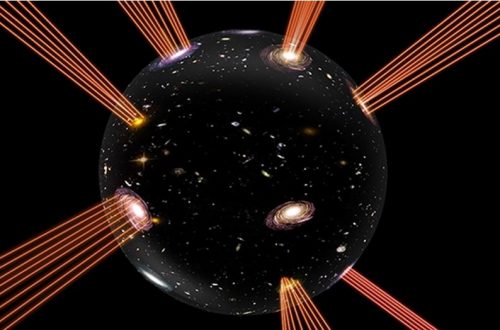Our Universe rides on an expanding bubble in an extra dimension, researchers propose. Their new model for the Universe may solve the mystery of dark energy.
Scientists from Uppsala University in Sweden wrote about their work in the journal Physical Review Letters (citation below). The authors were Souvik Banerjee, Ulf Danielsson, Giuseppe Dibitetto, Suvendu Giri, and Marjorie Schillo.
We perceive the Universe as everything that exists. It includes all space, time, matter, and energy everywhere. All the planets and stars that exist, plus galaxies and other bodies in space make up the Universe.
For the last two decades, we have known that the Universe is expanding. We also know that it is expanding at a progressively faster rate.
Scientists say it is doing this because of the ‘dark energy’ that exists throughout space. This dark energy pushes everything outward. In other words, it makes the Universe expand.
Understanding what dark energy is and its nature is one of the paramount mysteries of fundamental physics.

String theory
Researchers had long hoped that string theory would provide an explanation. String theory says that all matter comprises tiny, vibrating ‘string-like’ entities. It also requires space to have more than the three dimensions we all know about.
For about fifteen years, there have been models in string theory that scientists thought would give rise to dark energy.
However, many researchers have criticized these models. Several scientists are now insisting that none of them are workable.
Expanding bubble in an extra dimension
In this latest study, the authors propose a new model in which our Universe and dark energy are riding on an expanding bubble. They also propose that this giant bubble is in an extra dimension.
The entire Universe, they believe, is located on the edge of this ever-expanding bubble. All matter that exists in the Universe corresponds to the end of strings that reach out into this extra dimension.
The authors also show that this kind of expanding bubble may come into existence within string theory’s framework.
They also say that there might be more bubbles than ours. The additional bubbles would correspond to other Universes.
This model, say the researchers, provides a novel and very different picture of the creation of the Universe. It also provides a different future fate of the Universe. Additionally, it may open the door for ways to test string theory.
Citation
“Emergent de Sitter Cosmology from Decaying Anti–de Sitter Space,” Souvik Banerjee, Ulf Danielsson, Giuseppe Dibitetto, Suvendu Giri, and Marjorie Schillo. Physical Review Letters, 121, 261301 – Published 27 December 2018. DOI: https://doi.org/10.1103/PhysRevLett.121.261301.
